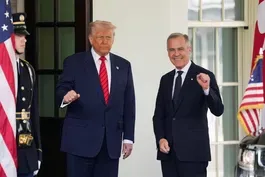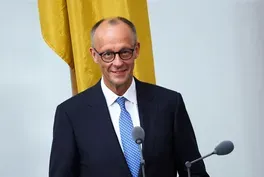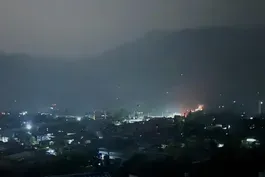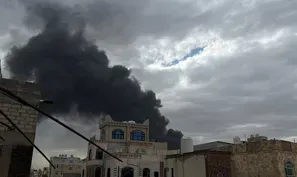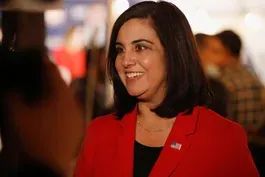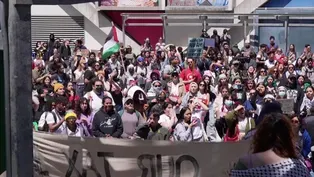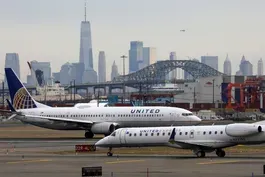
Understanding the conclave and the selection of a new pope
Clip: 5/6/2025 | 7m 24sVideo has Closed Captions
Understanding the conclave, the secretive process to choose a new pope
Wednesday, Catholic cardinals from across the globe will gather for the conclave to elect Pope Francis’ successor. John Yang takes a deeper look at the high-stakes undertaking to select the next pontiff.
Problems with Closed Captions? Closed Captioning Feedback
Problems with Closed Captions? Closed Captioning Feedback
Major corporate funding for the PBS News Hour is provided by BDO, BNSF, Consumer Cellular, American Cruise Lines, and Raymond James. Funding for the PBS NewsHour Weekend is provided by...

Understanding the conclave and the selection of a new pope
Clip: 5/6/2025 | 7m 24sVideo has Closed Captions
Wednesday, Catholic cardinals from across the globe will gather for the conclave to elect Pope Francis’ successor. John Yang takes a deeper look at the high-stakes undertaking to select the next pontiff.
Problems with Closed Captions? Closed Captioning Feedback
How to Watch PBS News Hour
PBS News Hour is available to stream on pbs.org and the free PBS App, available on iPhone, Apple TV, Android TV, Android smartphones, Amazon Fire TV, Amazon Fire Tablet, Roku, Samsung Smart TV, and Vizio.
Providing Support for PBS.org
Learn Moreabout PBS online sponsorshipGEOFF BENNETT: Tomorrow, Catholic cardinals from around the world will gather for the conclave to elect the successor to Pope Francis.
John Yang takes a look now at the high-stakes undertaking.
JOHN YANG: White smoke from the Sistine Chapel's chimney, the signal that there's a new head of the world's largest Christian church.
It's the culmination of a centuries-old process that's shrouded in secrecy and traditions.
KIM DANIELS, Initiative on Catholic Social Thought and Public Life Director, Georgetown University: We are a church of 1.3 billion people around the world, and this is a fundamental question of importance both for all of the Catholics around the world, but also as a source of a moral voice on the world stage.
JOHN YANG: The procedure for electing a pope has been called a conclave since the Middle Ages.
JOHN L. ALLEN JR., Editor, Crux: The word conclave comes from two Latin terms, con meaning with, clavis meaning key.
It refers to the fact that cardinals are physically locked into a room, it's now the Sistine Chapel, and not allowed to come out really until they have picked a pope.
And this is because, in centuries past, they could become horribly deadlocked.
The famous instance was the conclave of Viterbo in the 13th century, where it literally took them almost 2.5 years to move from the death of one pope to the election of another.
And that situation was simply found to be intolerable.
JOHN YANG: And so Pope Gregory X, who emerged from that prolonged conclave, established strict rules in hopes of avoiding a repeat.
The process continued to evolve.
The modern framework is spelled out in the Apostolic Constitution Pope John Paul II issued in 1996.
Conclaves must start within 15 to 20 days after a pope's death or, rarely, resignation.
They're usually overseen by the dean of the College of Cardinals, a senior cardinal elected by cardinal bishops, the highest order of cardinals, and confirmed by the pope.
In this conclave, only 135 of the 252 cardinals are permitted to participate, what are called cardinal electors.
That's because only those younger than 80 can vote, a limit set in 1970 by Pope Paul VI.
JOHN L. ALLEN JR.: The desire was to be sure that those who were taking part in the conclave have their finger on the pulse of what is really happening in the church and what is really happening in the world, so they can make the best possible decision.
JOHN YANG: On the morning of the conclave, the dean will lead a special mass in St. Peter's Basilica.
His homily will be the last public message the cardinals will hear before being sequestered.
JOHN L. ALLEN JR.: And it can be extraordinarily important in framing attitudes.
In 2005, for instance, the celebrant of that mass was then-Cardinal Joseph Ratzinger, who delivered a stirring homily that led the cardinals in that conclave after the death of John Paul, many people believed, to select Ratzinger as Pope Benedict XVI in just four ballots.
JOHN YANG: In the afternoon, the cardinal electors will gather in the Pauline Chapel in the Vatican Palace, the official papal residence.
The group will proceed into the Sistine Chapel.
Beneath Michelangelo's majestic frescoes, they will swear an oath of secrecy.
The papal master of liturgical ceremonies will utter a simple command: MAN: Extra omnes.
JOHN YANG: Latin for "all out," ordering everyone not involved in the conclave to leave.
The doors will be locked, with the Vatican Swiss Guard standing watch.
From this point on, until they select the next pope, the cardinal electors will be completely sequestered.
KIM DANIELS: There are many measures being taken to make sure that it does remain private, jamming measures for outside devices, et cetera, with the idea that it's not a time for lobbying by other people or the effects of outside influences.
JOHN YANG: Voting will be secret, each cardinal casting an anonymous ballot with one name.
After each round of voting, the ballots are burned in a cast-iron stove.
If no one gets the required two-thirds majority, a chemical is added to produce black smoke.
After the first day, typically, there are two rounds of voting in the morning and two in the afternoon.
RALPH FIENNES, Actor: It's a duty I never thought I would have to perform.
JOHN YANG: Public fascination with the inner workings of this mysterious process was reflected in the surge in online viewings in the days following Pope Francis' death of the 2024 hit movie "Conclave."
RALPH FIENNES: This is a conclave, Aldo.
It's not a war.
STANLEY TUCCI, Actor: It is a war.
And you have to commit to a side.
JOHN YANG: But experts say the star-studded depiction of a pope's election is more Hollywood than Holy See.
JOHN L. ALLEN JR.: To take the movie "Conclave" as a guide to a real papal election is like taking the movie "Spaceballs" as a guide to real space travel.
That's just not reality.
In the Vatican, you're in the old world, not the new.
There certainly are politics, but the way they are expressed is far more genteel and indirect and subtle.
JOHN YANG: This year's conclave will be unlike any other due to notable changes in the church.
It's the most geographically diverse, with about 70 countries from six continents represented.
That reflects a vision of a more inclusive and representative church championed by Francis, who named 108 of the 135 cardinal electors.
KIM DANIELS: Even though Pope Francis has appointed so many of these cardinals, they will all arrive in Rome with different concerns at the forefront of what they're going to be thinking about.
Some of them, for instance, will be highly affected by the cuts to USAID.
Some of them will be highly affected by the climate crisis.
Some of them will come from a place where they want a very strong representation of traditional church teaching.
That's all part of the conversation and very important.
And from that will emerge our next Holy Father.
JOHN YANG: And when he does, the ballots will be burned with a chemical to produce white smoke.
He will be asked two questions: Does he accept his election as pope and what name does he want to be known by?
JOHN L. ALLEN JR.: The custom of a pope taking a new name reflects the very traditional Catholic idea that, when a man becomes a pope, he becomes something bigger than his biography.
He becomes the vicar of Christ on Earth and the successor of Peter.
And so to signify what a dramatic break in his life all this represents, he takes a new name.
JOHN YANG: The senior cardinal deacon will declare: "We have a pope."
(CHEERING) JOHN YANG: And then the 267th supreme pontiff will step out from the central window of St. Peter's Basilica onto the balcony and, as new hopes have done since the 17th century, offer his first blessing to the crowd.
The work of the conclave will be complete.
For the "PBS News Hour," I'm John Yang.
Carney shuts down Trump's threats to annex Canada
Video has Closed Captions
Clip: 5/6/2025 | 8m 5s | Carney shuts down Trump's threats to annex Canada, says tensions will take time to resolve (8m 5s)
The challenges Germany's new conservative chancellor faces
Video has Closed Captions
Clip: 5/6/2025 | 5m 18s | As Germany selects a new conservative chancellor, a look at the challenges he inherits (5m 18s)
India launches missile strikes into Pakistani territory
Video has Closed Captions
Clip: 5/6/2025 | 2m 21s | India strikes Pakistani territory in response to militant attack on tourists (2m 21s)
News Wrap: Trump says U.S. will stop bombing Houthi rebels
Video has Closed Captions
Clip: 5/6/2025 | 6m 30s | News Wrap: Trump says U.S. will stop bombing Houthi rebels in Yemen (6m 30s)
Rep. Malliotakis on breaking with GOP on Medicaid cuts
Video has Closed Captions
Clip: 5/6/2025 | 6m 4s | GOP Rep. Malliotakis on breaking with her party and taking a stand against Medicaid cuts (6m 4s)
Trump's college crackdown raises concerns about free speech
Video has Closed Captions
Clip: 5/6/2025 | 9m 39s | How Trump's college crackdown is raising concerns about free speech and academic freedom (9m 39s)
What's behind the major delays at Newark's airport
Video has Closed Captions
Clip: 5/6/2025 | 5m 52s | What's behind the major delays and cancellations at Newark's airport (5m 52s)
Providing Support for PBS.org
Learn Moreabout PBS online sponsorshipSupport for PBS provided by:
Major corporate funding for the PBS News Hour is provided by BDO, BNSF, Consumer Cellular, American Cruise Lines, and Raymond James. Funding for the PBS NewsHour Weekend is provided by...
